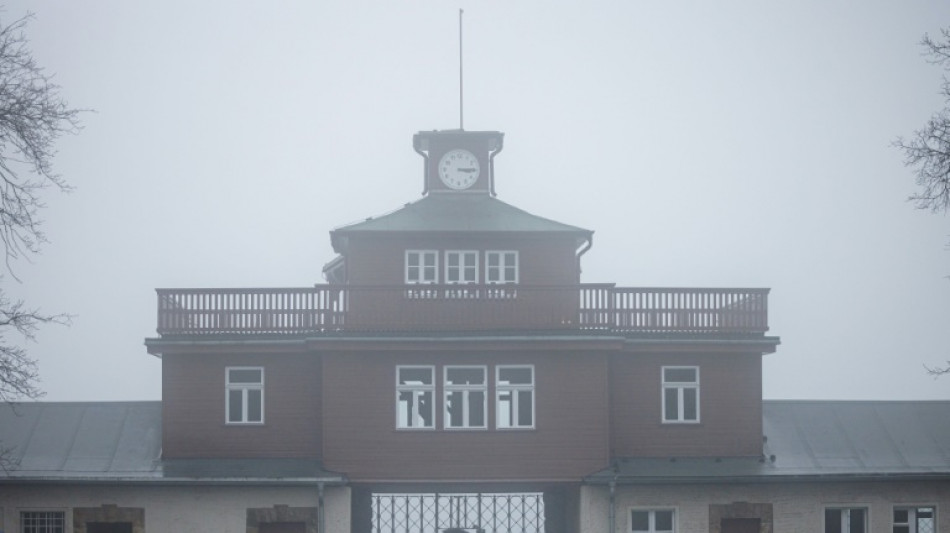

Rise of Germany's far-right AfD stokes fears at concentration camp site
The historian running the memorial at Germany's former Nazi concentration camp Buchenwald is no stranger to hate crime and threats, but he fears more trouble ahead after the far-right AfD's election triumph.
Jens-Christian Wagner says the rise of the anti-immigration party, which won Thuringia state elections with 33 percent of the vote Sunday, reflects a hardening of attitudes that could spell new dangers.
"My colleagues and I have been upset and depressed since Sunday evening," said the director of the foundation that administers the site.
Wagner said he worries about worse to come after a spate of attacks in recent years, both on social media networks that have been "flooded with revisionist content" and on site, including swastika graffitis.
The Nazi symbol has also been scrawled into the Buchenwald memorial centre's visitors' book, and vandals have cut down trees planted at the site in memory of survivors of the camp.
"The opinions directed against our memorial will grow stronger and it will be more and more difficult to change people's minds," predicted Wagner, a grim expression on his face.
The state leader of the Alternative for Germany (AfD) in Thuringia, the former high school history teacher Bjoern Hoecke, is one of the party's best known and most radical figures.
He has urged a break with Germany's post-World War II culture of repentance for Nazi crimes and sparked public outrage in 2017 when he labelled Berlin's Holocaust Memorial a "monument of shame".
- Police protection -
The Buchenwald site commemorates the deaths of more than 56,000 people between 1937 and 1945 out of around 280,000 prisoners there, among them Jews, eastern Europeans, political dissidents and disabled people.
Next April marks the 80th anniversary of the camp's liberation by US troops.
"Maybe nothing will go as planned," worried Wagner.
"Maybe we will have to re-install a police station," as was the case in the 1990s, when right-wing extremism flared in post-reunification eastern Germany, the historian added.
Wagner said he recently received four death threats, after sending a letter to 350,000 Thuringians to convince them not to vote for the AfD.
The AfD has little chance of entering government in Thuringia or elsewhere for now as all other political parties have refused to ally with it to form a government.
But Wagner fears the party, with its representation in the state parliament, could still work to reduce funding of the Buchenwald memorial, half of which is provided by the regional government.
In the event of a major budget cut, he said, it might have to limit the guided tours it offers.
Wagner also said that in future the memorial may use social media sites including TikTok to help spread its educational message.
- 'Downplaying the Holocaust' -
Some local people may support the AfD, a decade-old party which opposes multiculturalism, Islam and environmentalism, while condemning historical revisionism and extremism.
Those who have defaced and vandalised the Buchenwald site "are idiots with no political motivation and do not represent the AfD," said pensioner Uwe Baumann, 63.
He had come to visit the former camp with Hungarian friends and was crossing a vast open area surrounded by barbed wire, near the camp's former crematorium.
"The AfD is seen as the black sheep, but it has no problem relating to the Nazi past," Baumann said.
Wagner, however, argued that "the AfD not only downplays Nazi crimes but also spreads positive references to Nazism".
The historian pointed out that Hoecke had included a song by poet Franz Langheinrich, one of the architects of Nazi cultural policy in the 1930s, in his election programme.
This year, courts have twice fined Hoecke for knowingly referencing a slogan once used by a Nazi paramilitary group at rallies.
German politicians and anti-fascist groups have voiced similar concerns.
"By downplaying the Holocaust, Bjoern Hoecke also denies the foundations of German democracy," said Lorenz Blumenthaler of the Amadeu Antonio Foundation, an advocacy group committed to fighting the extreme right.
Germany's culture of remembrance, he said, was not "imposed by the government" but "comes from civil society".
German President Frank-Walter Steinmeier also voiced concerns about the shifting mood, speaking on Monday which marked the 10th anniversary of the creation of a memorial dedicated to disabled victims of Nazism.
"There are political forces that today are once again contesting (Nazi crimes), relativising or minimising them," he said.
"We are deeply ashamed of this."
姜-A.Jiāng--THT-士蔑報




